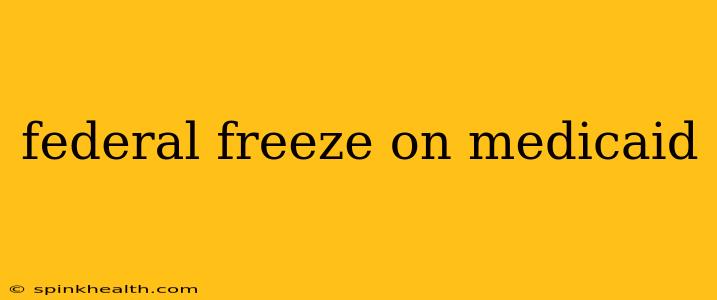The whispers started subtly, then grew into a roar. A federal freeze on Medicaid—the idea itself sent shivers down the spines of millions relying on this crucial safety net. But what exactly does a "freeze" mean? Is it a complete shutdown? A slow strangulation of funding? Or something else entirely? The reality, unfortunately, is complex and fraught with uncertainty, leaving states and individuals in a precarious position. This article unravels the intricacies of the situation, exploring its potential consequences and answering some burning questions.
What Exactly is a Federal Freeze on Medicaid?
A federal freeze on Medicaid isn't a simple on/off switch. It's more accurately described as a limitation or slowdown in the growth of federal Medicaid funding. Instead of the usual annual increases based on factors like inflation and population growth, a freeze essentially holds the funding at its current level. This means states receive no additional federal dollars to cover rising healthcare costs or an expanding population of eligible individuals.
Imagine a family relying on a fixed monthly income. Prices for groceries, rent, and utilities rise, but their income stays stagnant. That's the predicament states face when a federal Medicaid freeze is implemented. This situation intensifies the pressure on already strained state budgets, forcing difficult choices about healthcare access for millions.
What are the Potential Consequences of a Federal Medicaid Freeze?
The consequences of a Medicaid freeze ripple outward, impacting individuals, healthcare providers, and state budgets in significant ways.
-
Reduced Access to Care: With limited funds, states may be forced to cut benefits, reduce provider reimbursements, or tighten eligibility criteria. This could lead to fewer people receiving necessary medical care, resulting in delayed diagnoses, untreated conditions, and potentially worse health outcomes.
-
Increased Uncompensated Care: Hospitals and healthcare providers rely on Medicaid reimbursements to cover the costs of providing care. Reduced reimbursements mean hospitals absorb losses, which they might try to recoup by charging higher prices to privately insured patients. This ultimately drives up the cost of healthcare for everyone.
-
Strain on State Budgets: States are already struggling to balance their budgets. A Medicaid freeze exacerbates these challenges, forcing them to make tough choices between funding Medicaid and other essential services like education or infrastructure.
How Does a Medicaid Freeze Affect Different Populations?
The impact of a Medicaid freeze is not evenly distributed. Certain populations are disproportionately affected.
-
Children and Families: Children and pregnant women are among the most vulnerable groups dependent on Medicaid. A freeze could result in fewer preventative services, leading to increased health problems later in life.
-
Low-Income Individuals: Individuals living in poverty are most reliant on Medicaid for healthcare. Reduced access to care can exacerbate existing health disparities and limit opportunities for economic advancement.
-
Individuals with Disabilities: People with disabilities often require ongoing, specialized care. A Medicaid freeze could severely limit their access to essential services, impacting their quality of life and independence.
What are the Arguments For and Against a Federal Freeze on Medicaid?
The debate surrounding a Medicaid freeze is deeply divisive.
Arguments for a Freeze: Proponents often argue that a freeze is necessary to control spending and reduce the national debt. They may suggest that the program is unsustainable in its current form and that reforms are needed to ensure its long-term viability.
Arguments against a Freeze: Opponents argue that a freeze would disproportionately harm vulnerable populations and lead to worse health outcomes. They emphasize the crucial role of Medicaid in providing healthcare access to millions and warn of the potentially devastating consequences of limiting funding.
Will a Federal Medicaid Freeze Happen?
Predicting the future of Medicaid funding is difficult. The political climate, budgetary pressures, and shifting priorities all play a role. While a complete freeze might not be implemented, slowed growth or limitations on funding are definitely possibilities. Close monitoring of federal legislation and state-level developments is essential.
How Can Individuals and Communities Prepare?
Preparing for potential changes in Medicaid coverage involves staying informed, advocating for policies that protect access to healthcare, and building strong community support networks. Contacting your state representatives to voice your concerns is crucial. Understanding your rights and options under the Affordable Care Act (ACA) can also provide additional support during uncertain times.
The uncertainty surrounding the future of federal Medicaid funding creates a climate of anxiety and vulnerability for millions of Americans. Understanding the potential consequences and staying informed about developments is crucial in navigating these challenging times and advocating for the healthcare access we all deserve.

